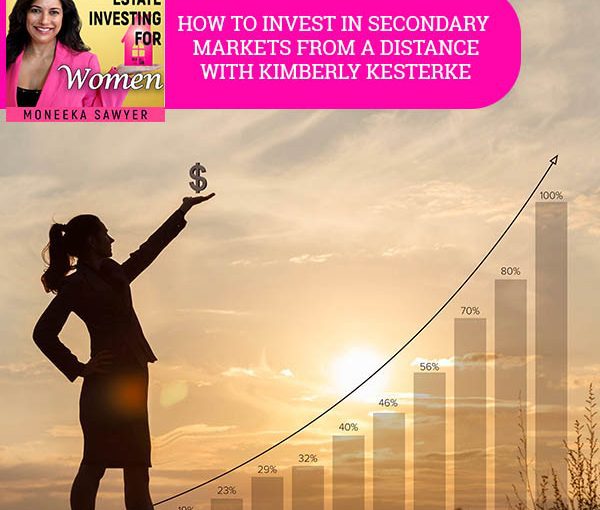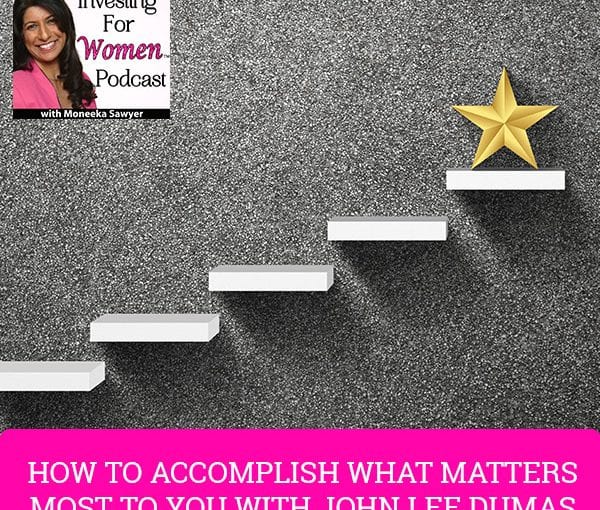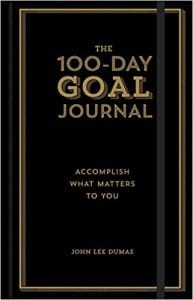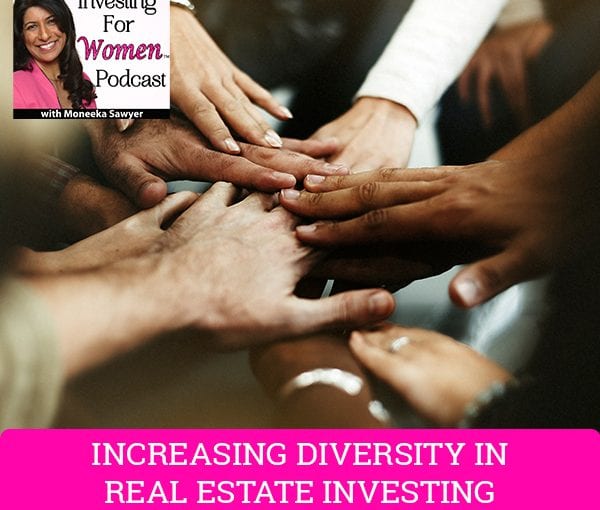Become the Bank for Passive Real Estate Income – Buy Notes
Moneeka Sawyer is often described as one of the most blissful people you will ever meet. She has been investing in Real Estate for over 20 years, so has been through all the different cycles of the market. Still, she has turned $10,000 into over $5,000,000, working only 5-10 hours per MONTH with very little stress.
While building her multi-million dollar business, she has traveled to over 55 countries, dances every single day, supports causes that are important to her, and spends lots of time with her husband of over 20 years.
She is the international best-selling author of the multiple award-winning books “Choose Bliss: The Power and Practice of Joy and Contentment” and “Real Estate Investing for Women: Expert Conversations to Increase Wealth and Happiness the Blissful Way.”
Moneeka has been featured on stages including Carnegie Hall and Nasdaq, radio, podcasts such as Achieve Your Goals with Hal Elrod, and TV stations including ABC, CBS, FOX, and the CW, impacting over 150 million people.
How To Invest In Secondary Markets From A Distance With Kimberly Kesterke – Real Estate Women
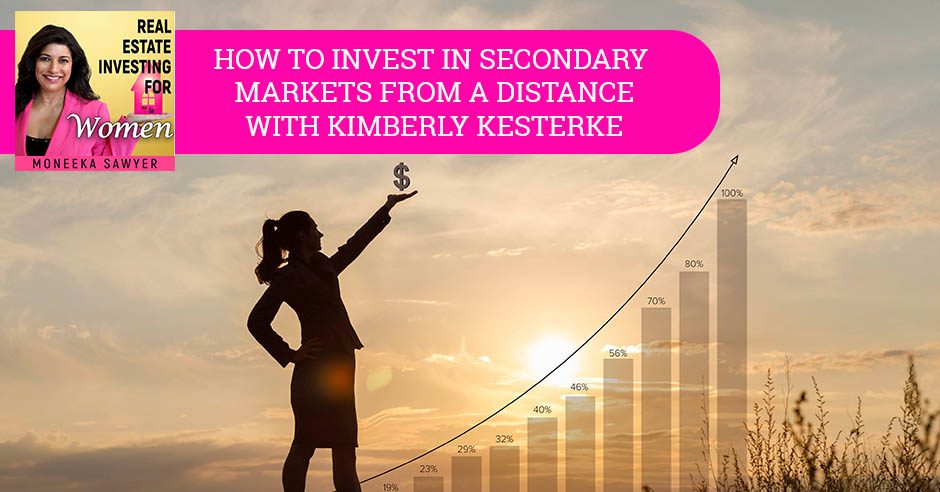
Distance should never be a barrier to building a successful real estate portfolio. With effective processes and a strategic approach, anyone can achieve financial independence through real estate investing. In this episode, Kimberly Kesterke, Founder of The W2 Landlord Community, discusses how to invest in secondary markets from a distance. She shares her expertise in managing a rental portfolio from a distance. With years of experience and effective processes, Kimberly has built a six-figure cash flowing rental portfolio while working a full-time job and raising a child. She shares her real estate journey, how she achieved this, and now coaches others to invest in real estate aligned with their strengths and minimize evictions and vacancies. Tune in and learn all about secondary markets to start your real estate journey now.
—
Watch the episode here
Listen to the podcast here
How To Invest In Secondary Markets From A Distance With Kimberly Kesterke – Real Estate Women
Real Estate Investing For Women
I am so excited to welcome the show Kimberly Kesterke. Kimberly is the Founder of The W2 Landlord Community and has many years of experience managing her rental portfolio from a distance. Kim built a six-figure cashflowing rental portfolio all while working at a full-time corporate sales job, raising a daughter, and managing our properties herself. Through that experience, Kimberly has created effective processes that resulted in only one eviction during the years and very few vacancies.
In 2019, she finally hired a property manager and, in 2020, started a Facebook community with four real estate investors with full-time jobs. Finally, in 2022, she quit her corporate sales job in order to focus on her real estate business full-time. That’s so exciting. She now works with coaching clients to help them build foundations in place to hit their financial independence goals and confidently invest in a real estate strategy that aligns with their strengths. Kim, welcome to the show.
Moneeka, it’s so good to see you.
It’s good to see you again. We’ve been on a couple of other panels together with real estate organizations, so it’s so much fun to finally have Kim meet you ladies and get to share her with you. Thanks, Kim.
Thank you.
Kim, it’s impressive that you have quit your job and now you’re fully into real estate, but how did you get started?
I got started back in 2006. I purchased my first home. If you remember that time, it was such a buzz. It was the responsible thing to do. Everybody was buying a house whether we had money or not. I was about 25 years old at the time, and I purchased my first property in Augusta, Georgia. That’s where I was living. I was working there.
Fast forward to 2008, we all know what happened. The economy crashed and at the same time was transferred to the Atlanta market, which is about three hours away from Augusta, for my sales job. I became an accidental landlord at that time. I decided to put tenants in place, rent the property, and managed everything from a distance, which back then it was unheard of to coordinate everything via phone and email, and not be onsite for all of those tasks and things.
I started to gain confidence. Over the years, I started acquiring a duplex here, and a triplex there and started building my portfolio. When 2019 came along, I decided to hire a property manager. I had about eighteen units at the time, and that’s how I got started. Consistency is what helped me build my portfolio over time.
Are all of your properties in Augusta, then?
Not anymore. Originally they were, but then as I started learning different strategies and investments, I branched out to other markets. I have properties all over. I have one in New York and a couple in North Dakota. In terms of managing secondary markets, I’ve expanded my portfolio that way.
How did you hire a property manager? Do they do everything remotely?
The property manager that I have is for my Augusta units. That’s where a bulk of my units are, and then the other properties that I own, I self-manage.
Talk to us about how you define a secondary market.
I define a secondary market as a market that is typically about 150,000 in population. It may have 3 to 5 industries within that market. What that tells me is that there’s a lot of support in that economy that would support people to move in, to rent, to buy all of those different things. In a secondary market, I also take a look and make sure that it’s a place that people want to live and that people would want to move to.
The reason why I look at 3 to 5 industries is because you don’t want to put all of your eggs in one industry. For instance, if that corporation or whatever that industry is, because every market is different, leaves, you don’t want to be caught with a property that depreciates very quickly. Those are some of the key things that I look for.
Don’t put all your eggs in one industry. Every market is different, and you don't want to be caught with a property that depreciates very quickly. Share on XHow do you find those markets?
There’s a variety of different ways. There’s a free tool that I use online called NeighborhoodScout. Let’s say I’m reading an article online, and it says, “Top 50 best places to invest.” I see that all over the place all the time. If I’m curious about it, I’ll go on to NeighborhoodScout. It’s a free tool. I’ll poke around, I’ll put the city in, and I’ll start looking at the different things to see if it’s a place that I’d want to dive in deeper and actually invest.
Why did you decide to do secondary markets?
I stumbled upon it with Augusta. Augusta, Georgia, is a secondary market. As I was building my portfolio, I looked around at all of the competition that a primary market brings, whether it’s hedge funds moving in or it’s a lot of investors competing for the same properties. Also too, for me, the secondary market fit my budget personally because I was at the time doing conventional loans that would be 20% down after you get a certain amount under your belt.
The price tag was a lot more attractive to me. It turned out that what I was putting in as a down payment to what the rents were worked out where I was still cashflowing, still making money, still getting the appreciation. It may not have been as broad as the Atlanta market, for example, but it was where I could afford it. I could continuously do it and still see good results.
You fell into that. How would you say other people can get started in a new market?
If there’s a market that somebody hears about or there’s a lot of buzz or maybe it’s not so much buzz, but they personally know a family that lives there who knows a little bit about it, then I would say start doing your research. The question is, “How do I research if I live half a country away?” Basically, what I said a little bit earlier is I’ll go on NeighborhoodScout.com. It gives a lot of information in their free tool.
I’m not affiliated with it. That’s what I’ve used. You can drill into different ZIP codes, you can check crime rates, where the industries are, or what kind of industries. You can then take that information, walk over to Zillow, and then start seeing what the rents are. If it’s starting to look like a market that matches the type of tenant avatar that you’re renting to or if it’s matching all of the different check boxes that you have, then it’s one to start exploring further by calling some property managers or getting on the local city Facebook group and start diving in that way.
Talk to me a little bit about calling property managers. I’ve heard that before. It’s a great tool to utilize and get to know new markets. Tell me a little bit about how you managed that process.
I personally did this for a property that I was looking at in Port Charlotte, Florida. I ended up buying it. I had never been to Port Charlotte. I love the area now, knowing more about it. What I did before I put an offer in and closed on the property was I called a couple of property managers and gave them the details of the property. I said, “This is it. This is what I’m thinking of renting it at. What are your thoughts?” They gave some good advice.
I was even looking at renting a little bit lower than I should have, which was nice. I was able to up my rate and learn a little bit more about how snowbirds are coming down. It’s more information than I ever would’ve known. If you think about it, property managers are going to obviously know the area because they have dozens, if not hundreds, of properties that they’re managing. If they understand who you’re renting to and what your investment strategy is, they can give you good advice.

Secondary Markets: Property managers are going to obviously know the area because they have dozens, if not hundreds, of properties that they’re managing. If they understand who you’re renting to and what your investment strategy is, they can give you good advice.
Do you ever feel obligated to hire them?
If I personally buy there, then yes, I would because it’s a fair exchange that way.
With that Florida property, did you hire a property management company?
Yes. We ended up hiring that property management.
What strategies would you say work well for managing at a distance? For some of the properties you have a property manager, but what are some of your strategies for being far away and still managing properties?
For my rentals, where it’s more of a landlord-tenant relationship, long-term rental, those properties are managed by a property manager. I also have another strategy in place where I will acquire a property and then I’m, in essence, the bank. What I’ll do is I’ll buy the property and sell it either with rent-to-own terms and/or, depending on what price, I get that property seller financing, where it might be a land contract or land installment contract for deed. I’ve done a lot, a wide variety of different ones. I’ve even done a seller finance where, at the closing table, the deed transfers.
There are a lot of different ways that you can do it. What I like about that and why I think it’s very attainable to invest in secondary markets anywhere is you don’t have to do the maintenance. You’re, in essence, the bank. The biggest thing you’ve got to make sure of is you collect the payments, and there are loan servicing companies that can do that. They’re only $10 to $15 a month. It’s one of those things that if you’re looking for creative ways to get out of your market but don’t want all the hassle of the maintenance and the risk, selling properties as the bank is a good way to go.
That was a lot of information. First of all, with the loan servicing companies, if they need to collect late rent or anything like that, do they charge extra or is it that flat fee?
Yes, you have to put your terms upfront, whatever your terms are. If it’s after the fifth you collect 10%, you’ve got to give them that, but that is how they process it.
What happens if someone doesn’t pay?
It depends on how you structure it. If you structure it more in a contract-for-deed format where the deed transfers after everything is paid off, then you can go through an eviction process. You don’t necessarily have to foreclose. If you structure the deal that the deed transfers at closing, then you would have to go through a foreclosure. Keep in mind that every state is different. If this is something you’re interested in, talk to your local title agency or your real estate attorney and understand what works for your state because everybody’s slightly different.
When you mentioned that there were several different ways to be the bank, you mentioned three right off the top of your head. I understood everything you said, but most of my readers probably will not. Can you take that down a little bit more?
The first one is contract per deed. I like that one because if you imagine somebody goes and gets a car loan, you don’t get the title of the loan until you pay it off. Basically, that’s what you’re offering as the seller. You don’t transfer the deed until it’s paid off. You could amortize that for 30 years, 15 years, or whatever you want to do. The deed transfers after the fact. What’s nice about that strategy is that you get a lot of tax benefits. You get good cashflow. There are some good strategies for that. That’s one of them.

Secondary Markets: A contract per deed is a nice strategy that allows you to get a lot of tax benefits and good cash flow.
Do you take a down payment for that one?
I do.
Do you have an idea of the percentage of what you take, or is it a flat rate? What do you normally do about that?
What I do personally is 10% down. I’ve tried a wide variety of different ones. I’ve done, depending on the area, $2,000 down. I’ve done a wide variety. A 10% down, I believe, attracts a person that wants a loan or a mortgage and is going to pay on time. It’s a good qualifier, in my opinion.
You’re the rent to own. They’re paying principal and interest. What kinds of rates do you normally charge?
It all depends. Usually, I take what the prime is and add a couple of points to it because there is a premium to being able to offer the terms. If they could go down and get a conventional loan, then go get the conventional loan. As the investor, we’re taking on a little bit more of the risk, so we can charge a little bit of a higher interest rate.
Now go to the second strategy.
The land installment is another way of saying contract for deed. That’s how I clump those two together. The rent to own, that one’s a pretty cool, unique way to do it because you collect a non-refundable option fee upfront. What that is, is that is also a down payment but non-refundable. It will go against the final principal. At the same time, as an investor, you can manage the monthly payments any way you want. It’s not a straight amortization like a contract for deed or land installment. A rent to own, you can charge the rent and then, as the investor, you can choose how much that rent payment goes towards the principal.
At the very end, they have what we term a balloon payment, and the non-refundable option fee is obviously taken out of that principal. Whatever you decided as the investor with the tenant-buyer, how much each month was going to be applied to it. Rent to own is a cool strategy because there are a lot of exit strategies. They can cash you out after 2 to 4 years. You can redo the lease for another 2 to 4 years, however long you want, and then negotiate with them how much of that payment is actually going to the principal.
The contract to own and the rent to own are similar, but there are some subtle nuances it feels like. Is that true?
It is. It all depends on what your comfort level is, your state, and what the different rules are for evictions and contracts. I’m operating where I operate. The rules could vary. Understanding your specific areas is what my advice would be.
Understand your specific areas. In real estate, operations can depend on your comfort level, your state, and what the different rules are for evictions and contracts. Share on XIf you were starting all over, what would you do?
I love that question because I did a Facebook Live about that. When you look at the way that the economy is now, it’s completely different than what it was from 2006 to 2008. You could get conventional loans at very low-interest rates. Nowadays, what I personally would do is I would purchase a property, and I’m doing this right now, and I would basically flip it without doing much of anything. What I’m doing is I’m flipping the paper. I’m offering either contract for deed, I’m offering rent to own, and then I’m holding that property as long as I can in those specific terms.
What I like about that is, especially where I came along in my investing journey, I like to take a more conservative approach. I guess I’m boring that way, but I like the conservative consistency. In this approach, you know what your cashflow’s going to be on a monthly basis as long as they pay. There are alligators in every water, but let’s say they always pay, you’re getting that cashflow and maintenance isn’t eroding your profits. That’s a great way for people to start and understand real estate investing.
What kinds of properties are you buying, or how are you finding the properties?
I’ve found them in a variety of ways. Now, where I’m getting my properties is I’m sending out letters to sellers and people who own the property but don’t live in the property. I’m sending out letters on this is what I can offer and what I’ve been slowly acquiring but acquiring them that way.
How are you determining the sale price for the properties?
It’s a combination in terms of what I’m selling after I buy it. It’s a combination of looking at the comps and also knowing that I’m also providing a premium for people to purchase, not having to go to the bank. I’ll take a look at comps and pretty much price it where I’m still making some profit, but it’s still within line with what the local comps are.
Let’s say, for instance, you have a contract that’s five years and you’re selling this property with a five-year contract. In five years, that property would’ve appreciated. You’re basically giving up that appreciation in favor of a little bit of a higher interest rate. Is that what I’m hearing?
Not entirely. It’s what is reasonable. Let’s take the Florida property, for example. Looking at the local comps, the higher comp was around $600,000. What my business partner and I did was we took a look at it and we’re like, “Let’s price it more around $599,000. Let’s see if we get some interest.” We got a tremendous amount of interest. We were able to purchase it at a lower price, the way that we were able to work with the seller and work with the wholesaler that brought that property to us. We still made a profit that way.
In that sense, you never know what’s going to happen in five years. You could say you are foregoing some appreciation for the higher interest rate, but we still ended up making money. It was one of those win-wins where we were making money. We were able to get a tenant buyer that was happy with it and, at the same time, everyone is winning out of the situation.
You quit your job to go full-time into real estate. We’re going to talk about this in a deep dive in EXTRA, but could you give us a high level of what it took for you to make that transition? I know so many of my ladies want to make that transition but don’t even know it’s scary. How do you get started even thinking about that?
For the record, maybe because I’m a slow learner, it takes me a while. It took me two years after I decided I wanted to do it. The reason why is because I put some processes in place. I wanted to put some goal marks in. I wanted to hit certain things before I felt that I would be ready to leave my corporate job. I was doing well, and it was something that I wanted to do in real estate full-time. That’s where I was at.
What I ended up doing is I first took a look at my portfolio in its entirety. I took a look to see which ones are the more profitable ones and which are not. I sold the ones that were lagging a bit, the 1031 exchange into some higher profitable property. That took a little bit of time. I had to take a look at what my true expenses were.
Not the bottom of the barrel if I’m surviving expenses, but I wanted to know what does my life cost when I’m doing the things I want to do and going where I want to go. I’m living feeling free and abundant. I wanted to know what that number was and then I wanted to make sure that my cashflow either hit that or was there enough that if I had to do some active income, I still was living the life that I wanted to live. There are more things that I did, but those were two major things I wanted to make sure happened before leaving.

Secondary Markets: Be aware of the cost of doing the things you want to do and going to where you want to go. Make sure you’re aware of the costs and benefits, and if it’s enough, before you proceed.
All that prep and stuff, we are going to talk about that in EXTRA, and I’m excited about that. Nobody’s talked about that on that show. We’ve met a lot of people that made that transition, but they haven’t talked about that process that actually happens between being a W-2 employee and being a real estate investor. I’m super excited about that. We will talk about that in EXTRA. This has been awesome. Is there anything else you want to share that I haven’t asked about?
If people want to get in touch with me, I do have a free Facebook group. It’s the best place to go and have investing conversations with other people that have full-time jobs. It’s called Real Estate Investors with Full-Time Jobs at Facebook. I wanted to make it obvious. That’s the name of the group. They can also come to my website, TheW2Landlord.com. I’ve got different resources up there as well.
Thank you so much for that. Are you ready for three rapid-fire questions?
Yes, absolutely.
Tell us a super tip on getting started investing in real estate.
I would say don’t overanalyze because taking action and jumping in sometimes is the better way to go. What I love about real estate is there are dozens of exit strategies that even if you feel your plan A isn’t working out the way you wanted it, there are a lot of different ways that you can still monetize and earn a profit on that deal.
What would you say is one strategy to be successful as a real estate investor?
I would say consistency. It’s not always about the big home runs. A lot of times, it’s about taking a deal that you know you’re going to make money on and letting that be okay. It doesn’t necessarily have to be the big grand slam because you’ll get those from time to time. Like in corporate sales, you always get those big sales, but it’s the small and consistent wins that help you build your portfolio and your net worth.
Like in corporate sales, you always get those big sales, but it's the small and consistent wins that help you build your portfolio and your net worth. Share on XWhat is one daily practice that you do that you would say contributes to your success?
I’m constantly networking, and I think that the group helps. When I say networking, it doesn’t necessarily have to be sending DMs. It’s more about being on the Facebook groups, dropping if there are questions, and answering them. Maybe you see somebody who’s a lender. I had a conversation with somebody who lends in all 50 states. We ended up having a good conversation on the phone. It’s connecting with people. You never know who’s going to approach you with an opportunity or you might even be able to help them and send them a lead. This particular business is such a win-win industry if we’re all supporting each other.
This has been amazing. Thank you so much. You gave us so much information in this bite-sized episode. I loved that. Thank you.
Thank you. This has been great, Moneeka. I’m glad that we were able to connect, and thank you for the invite.
Thank you for joining Kim and I for this portion of this show. We’ve got more right on EXTRA. We’re going to be doing a deep dive on how to prepare for that exit out of your full-time job into becoming a real estate investor full-time. What’s fun about becoming a real estate investor full-time is that it’s not full-time. You get so much time freedom once you make that transition. We’re going to be talking about exactly how Kim did that, from her high-paying corporate job to real estate investors. We’re going to do that in EXTRA.
If you are subscribed already, stay tuned. If you’re not and would like to be, go to RealEstateInvestingForWomenEXTRA.com and you can subscribe there. For those of you that are leaving us now, thank you so much for joining us. I look forward to seeing you next time. Until then, remember, goals without action are dreams. Get out there, take action, and create the life your heart deeply desires. I’ll see you soon.
Important Links
- The W2 Landlord Community
- NeighborhoodScout
- Real Estate Investors with Full-Time Jobs – Facebook
- RealEstateInvestingForWomenEXTRA.com
Get Dr. Shaler’s free EBook: “How to Spot a Hijackal” at https://www.forrelationshiphelp.com/help-handling-hijackals-spot-signup/
To listen to the EXTRA portion of this show go to RealEstateInvestingForWomenExtra.com
——————————————————
Learn how to create a consistent income stream by only working 5 hours a month the Blissful Investor Way.
Grab my FREE guide at http://www.BlissfulInvestor.com
Moneeka Sawyer is often described as one of the most blissful people you will ever meet. She has been investing in Real Estate for over 20 years, so has been through all the different cycles of the market. Still, she has turned $10,000 into over $5,000,000, working only 5-10 hours per MONTH with very little stress.
While building her multi-million dollar business, she has traveled to over 55 countries, dances every single day, supports causes that are important to her, and spends lots of time with her husband of over 20 years.
She is the international best-selling author of the multiple award-winning books “Choose Bliss: The Power and Practice of Joy and Contentment” and “Real Estate Investing for Women: Expert Conversations to Increase Wealth and Happiness the Blissful Way.”
Moneeka has been featured on stages including Carnegie Hall and Nasdaq, radio, podcasts such as Achieve Your Goals with Hal Elrod, and TV stations including ABC, CBS, FOX, and the CW, impacting over 150 million people.
How To Accomplish What Matters Most To You With John Lee Dumas
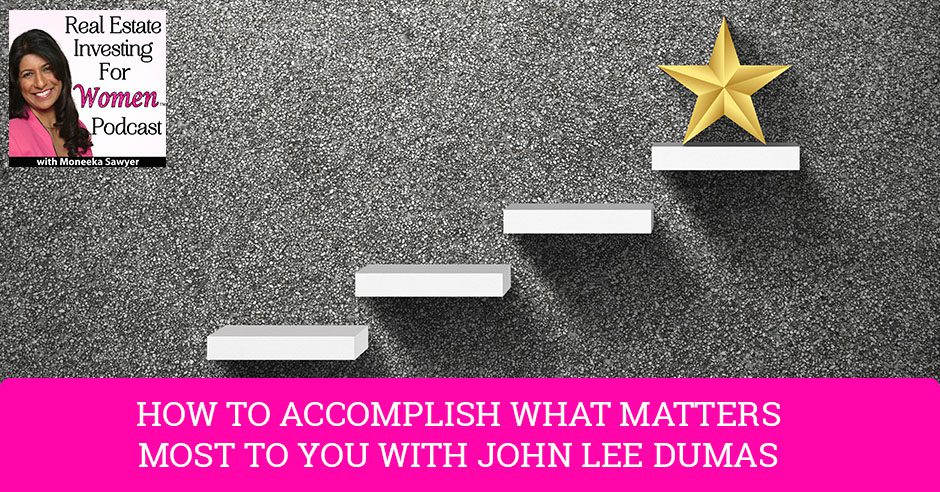
2020 has been a long year. Now, we’re finally at its final chapter, and what better way to bring this challenging book to a close than to look back on the lessons we’ve learned and look forward to the next? In this episode, Moneeka Sawyer invites John Lee Dumas, the host of Entrepreneurs on Fire, to help us bring in the new year by talking about setting and achieving the goals that matter most to us. Taking with him wisdom from successful entrepreneurs, he shares The 100-Day Goal Journal that can guide you to your success as well as what is called the SMART goal. Join Moneeka and John as they break down its components and show you how you can greet the new year living your best self and being on fire.
—
Listen to the podcast here
How To Accomplish What Matters Most To You With John Lee Dumas
Real Estate Investing For Women
I have a special episode for you. I am bringing on John Lee Dumas. He is the host of Entrepreneurs On Fire, an award-winning podcast where he interviews inspiring entrepreneurs who are truly on fire with over 2,500 episodes, one million-plus listeners a month, and seven figures of annual income. JLD is just getting started. I’ve asked John to help us bring in the new year by teaching what he lives better than most, setting and achieving the goals that matter most to us. I am excited to welcome to the show the only man on fire, John Lee Dumas. How are you?
Moneeka, it is great to be here. I love your energy and your vibe. It’s always awesome hanging out with you.
John, you put together a journal called The 100-Day Goal Journal: Accomplish What Matters to You. I know that you talk to entrepreneurs all over the place. Talk to me about why goals are important. Why did you put together this particular journal?
I’ve interviewed over 2,700 successful entrepreneurs. To be honest with you, I can only pull out a couple of themes that almost every single one of those 2,700 have in common. One of those few themes that are across the board is successful entrepreneurs know how to set goals, and then they know how to accomplish those goals that they’ve set. Frankly, unsuccessful people don’t know how to do either and they’re not doing either, and they’re suffering as a result. I wanted to create a strategy guide for people to step-by-step understand what it means to accomplish a goal that matters to them. That’s why The 100-Day Goal Journal exists, and I’m proud of that work.
I can’t wait to use it. Talk to me a little bit about what is a meaningful goal from your perspective?
“Successful entrepreneurs know how to set goals and how to accomplish those goals.” ~ JLD
First off, you could step back and say, “Let me set a SMART goal.” A SMART goal is five components, Specific, Measurable, Attainable, Relevant, and Time-bound. It’s critical. Those five things need to be part of your goal every single time, and a lot of people don’t focus on the meaningful part of the goal. A lot of people accomplish a goal to be like, “I accomplished the goal, but why is my life still the same? It doesn’t feel like it’s moved forward.” It’s because you didn’t set a meaningful goal. You just set a goal and you accomplished it.
It has to be meaningful and it has to be something that matters to you. That’s why you’ve got to be specific with it. It’s got to be measurable. You got to measure what that goal is that you’ve accomplished. It’s going to be attainable. It can’t be unrealistic. Otherwise, you’ll quit. It’s got to be relevant. That’s that meaningful part. It’s got to matter to your life, then it’s got to be time-bound. You have to set a timeframe, which is why I use 100 days. Those are the critical components that a lot of people miss when they set goals, and it has to be a part of it.
Talk to me a little bit about the 100 days. To me, that seems like such an arbitrary number. Could you tell me a little bit about why you chose that?
I don’t want to say that it’s not arbitrary because it’s got some arbitrariness in there for sure. There’s no magical formula that 100 days is the perfect number. For me, I wanted to sit down and say, “What is a timeframe that feels realistic?” People are like, “I’m going to do this in 2021.” For me, a year is way too long of a timeframe. Yes, a year goes by like that but when you’re in the beginning part of it, it feels like you have all the time in the world to accomplish that goal because you have a full year. At the same time, anything like 25, 35, 55 goes by in a blink of the eye. I want people to not look at too short of a timeframe and say, “I’m not willing to create a stretch goal that’s going to push me.”
I want people to, number one, feel like they have a good amount of time, but not too much time that they procrastinate. To me, the 100 days slotted in there nicely where it’s enough time to accomplish something big, but not too much time where you feel like you can just slack off the beginning. You get 100 days and when you wake up the next day, you’re already down to double digits. You’re at 99 days. The clock is ticking. It’s time to get your butt moving and make things happen. It’s arbitrary, but it’s something that has worked for me, so that’s why I went with it.
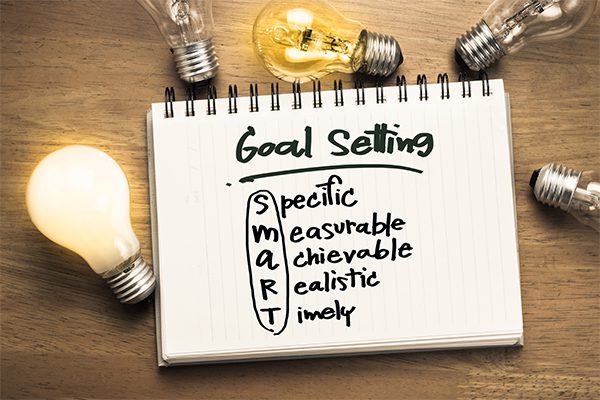
Accomplish What Matters Most: A SMART goal is five components: Specific, Measurable, Attainable, Relevant, and Time-bound.
If someone doesn’t succeed in achieving their goal in 100 days, what do you recommend?
I’m a big believer that if you get to the 100 days and you haven’t accomplished your goal, it’s time to assess. In fact, in this journal, you have reassessments where you’re looking back at day 25, 50, and 75 to identify your progress and hold you accountable that you are moving forward at the pace you should be. Frankly, you’ll know well before day 100 if you’re not going to accomplish your goal because there are all these specific check-in points on the way. There’s nothing wrong at day 75 to adjust your goal down, or maybe jack it up if you’re way ahead of the game.
Nothing’s wrong with that because this is not a perfect science. This isn’t like this recipe where if you get one ingredient wrong, the whole thing’s terrible. That’s not the case. This is a fluid process. That’s the best word. Challenge yourself. If you’ve got to tweak things down a little bit by day 50 or 75, you’ll know it and do so. If you’re going to jack things up because you’re way ahead of schedule, do that too so that by day 100, you’ll know 100% where you’re going to be by that point and you’re going to feel good about it.
How do you know if you’re succeeding?
If your goal is being accomplished and you’re seeing marked progress. That’s part of the process where you are grading and judging yourself every step along the way. You’re being hard on yourself. You need to be your own worst critic. This book, journal, guide, strategy, and system ensures that you are your most harsh critic because you need to be. Nobody else cares about you. I hate to say it, but they don’t care about you because they’ve got their own stuff they care about. It’s not that they don’t like, don’t love you, and not rooting for you. Frankly, they don’t care that much about your goal because they got their own crap that they’re worried about. Their life is crazy, mayhem, and tough enough without thinking about you every 10 seconds or 10 days or 100 days. Realize that you are your own best cheerleader. At the same time, you’ve got to be your own worst critic too.
“You are succeeding if your goal is being accomplished and you’re seeing marked progress.” ~ JLD
Nobody cares about you as much as you care about you. That’s the thing. We’ve got all our own stuff. Even an accountability coach or partner is not going to care about your achievements as much as they’re going to care about their own because they’re not in your head or in your life. That’s what I love so much about this journal. It makes you your own accountability partner. Could you talk a little bit more about accountability, specifically on why is that so important?
Even though nobody’s going to care about us like ourselves, we need that kick in the butt by people who care about us. When you are in an accountability group and you have people who you’re counting on and they’re counting on you, then there comes this bond together where you are rooting for each other, checking in with each other, and don’t want to let each other down. It’s critical. I have multiple masterminds for different parts of my life.
I’ve got a health mastermind and a business mastermind because I want to make sure that I’m excelling in both areas of my life. To do that, I need accountability in both areas of my life. That’s an example of why an accountability group is important because it’s going to ensure that you don’t just slither away and go watch Netflix all day. You know you’ve got a meeting with your partners, accountability group, or mastermind, and they’re going to want to know what you’ve done.
Would you call this journal your own personal accountability partner?
Absolutely. That’s why I wanted and liked the idea of a physical journal because you can’t hide from that. You can’t put the folder on your desktop and hide it somewhere. It’s on your bed stand, on top of your desk, and on your briefcase. It’s there taunting you, “I dare you not to use me today because the proof will be in the pudding.”
“Realize that you are your own best cheerleader. At the same time, you’ve got to be your own worst critic too.” ~ JLD
I heard you on another podcast talk about focusing on your strengths when setting your goals, which many people do like, “I’m going to improve this about myself,” but they’re trying to improve the thing that they suck at. To be blissful, which is what I’m all about, you want to focus on what’s awesome about you and make it awesome. Do you agree with me on that?
We don’t need another C student in this world. That’s the problem. We will go down this rabbit hole but a big problem with traditional education is they’re like, “You got an A in this subject. Good. We don’t need to focus on that anymore. You got a D and a C here. Let’s spend all of our time here.” It’s the opposite. What are you naturally great at? What are you good at right now? How do you become even better at that? Why do you want to go from a D to a C? You’re going from crappy to still crappy. This world doesn’t need more crappiness.
What this world needs is you living in your bliss, living in your best self, and you being on fire, and that’s going to happen when you’re doing what you love and what you’re great at. That’s how you’re going to blossom and that’s what the world needs. That’s why I’m a big believer in saying, “What am I great at? Let me spend all my time doing that.” The things you’re not good at, hire people on your team to do those things or don’t do them at all because it’s not worth doing average. It’s not going to move the needle for you. I only do a handful of things in my business. I only do the things that A) I’m good at and that B) I enjoy doing. That’s it. The other things that happen in my business are because I’ve hired the right people to do those things.
If you’re good at something or you enjoy doing it, you’re still going to fail. Failure is part of the game. Could we talk a little bit about that?
Failure is 100% part of it. In fact, I was in an interview where I was talking about sports and they say, “Why do you love sports?” I’m like, “I love sports because it taught me as a child growing up that you’re going to lose and you’re going to fail, but there’s always that next game. You don’t know if you’re going to win or lose that next game, but there’s always that chance to win and hit that home run.” It’s even more applicable in business and life because you can fail 100 times in a row. If you win on the 101st time, that’s everything and that’s all that matters. That’s all people will know you for.
Does anybody know me for all the failures I had before I launched Entrepreneurs On Fire? No, because they don’t care about that. I don’t care about that. We don’t spend any time talking about that. What they know me for is my one success, which was launching Entrepreneurs On Fire. That was my first and biggest win. That’s what propelled me to where I am today. It’s even better in business than sports because if you lose 100 times and you win 101 times, your record is 1 in 101. You still won, which is great, but it’s still a crappy record. In business, you just want to know you won the game and you can take that to the highest level. That’s why failure is part of it. It’s getting back up and swinging everything.
Thank you for that. That is a big difference. In business, you can become an overnight success immediately. It could take you 30 years to get there, but then suddenly, you’re there. It’s amazing. My perspective on failing is this. When we’re reaching for a goal and we’re trying to succeed, we are becoming the person who can succeed. We become a better version of ourselves as we’re reaching for that goal. The thing about failure is along the way, it shows us who we’ve become. How we deal with those failures and how we handle a challenge or a let down shows us who we have become along the way towards our success.
In a way, it’s a milestone and a necessary thing in creating success. Without it, we don’t grow better and we don’t become bigger. The goals aren’t as amazing in general. They’re also not as gratifying. If you buzz to the top, you’re not going to be as fulfilled as if you had to learn along the way. Failure is an amazing piece of the success formula. Could you tell us one daily practice, John, that you would say contributes to your personal success?
Every day, I do fifteen minutes of yoga. It’s stretching-focused yoga. It’s part of my daily rhythm. I love it because a stretch is a time that I’m contemplating my day in a meditative state. I’m relaxed and I’m doing deep breathing. I’m having this private enjoyable moment that’s great for my body, mind, and soul. It’s this nice quiet start to my day. I will take that over a cup of coffee any day. Although I still drink my coffee.
John, this has been amazing. Thank you for joining us and sharing all your amazing wisdom with my ladies.
“What this world needs is you living in your bliss, your best self, and you being on fire.” ~ Moneeka Sawyer
It’s beenawesome, Moneeka. Thanks for having me. Take care.
—
Ladies, thank you for joining John and I for this portion of the show. Wasn’t it amazing? I am excited about starting off the year in a powerful way and helping you ladies achieve your goals. That’s what this show is all about. I’ve got more in EXTRA. I am going to be doing a process that helps you to integrate your goal into your future. What that will do is it will pull you forward almost seamlessly towards the goal that you want to work on that matters to you most. That’s what we’ve got in EXTRA. The other thing I wanted to mention is that I am going to be working on John’s journal so that I can reach my favorite goal, the one that matters most to me for the first 100 days of the year.
If you would like to join me on that, go ahead and purchase your copy of the journal. You can go to BlissfulInvestor.com/100dayjournal. Email me and I’m going to put together a list so that we can support each other towards meeting our goals. I’ll put together some videos about my process. I’ll help you, ladies, if you have questions. I have so much inspiration around this and I don’t want to let it go. I’d love you to join me through the whole process. We can do this together, but for now, stay tuned for Real Estate Investing for Women EXTRA so that I can take you through this amazing process to integrate your goals into your future.
If you are subscribed to EXTRA, stay tuned. It’s coming next. If not but you would like to be, please go to RealEstateInvestingForWomenExtra.com. You get the first seven days for free, so you can download this episode and you could download as many past episodes as you want to. You can just check it out and see if it’s for you. This might be exactly the time to get started on that extra step towards building your financial future. For those of you that are leaving us, thank you for joining me on this New Year episode of Real Estate Investing For Women. I appreciate you and I look forward to seeing you next time. Until then, remember, goals without action are just dreams. Get out there, take action, and create the life your heart deeply desires. I’ll see you next time. Bye.
Important Links
- Entrepreneurs On Fire
- The 100-Day Goal Journal: Accomplish What Matters to You
- BlissfulInvestor.com/100dayjournal
About John Lee Dumas
 John Lee Dumas is the host of Entrepreneurs on Fire, an award winning podcast where he interviews inspiring Entrepreneurs who are truly ON FIRE.
John Lee Dumas is the host of Entrepreneurs on Fire, an award winning podcast where he interviews inspiring Entrepreneurs who are truly ON FIRE.
With over 2000 episodes, 1 million + listens a month, and seven-figures of annual revenue, JLD is just getting started.
Visit https://swiy.io/eof to set YOUR Entrepreneurial journey ON FIRE!
To listen to the EXTRA portion of this show go to RealEstateInvestingForWomenExtra.com
To see this program in the video:
Search on Roku for Real Estate Investing 4 Women or go to this link: https://blissfulinvestor.com/biroku
On YouTube go to Real Estate Investing for Women
——————————————————
Learn how to create a consistent income stream by only working 5 hours a month the Blissful Investor Way.
Grab my FREE guide at http://www.BlissfulInvestor.com
Moneeka Sawyer is often described as one of the most blissful people you will ever meet. She has been investing in Real Estate for over 20 years, so has been through all the different cycles of the market. Still, she has turned $10,000 into over $5,000,000, working only 5-10 hours per MONTH with very little stress.
While building her multi-million dollar business, she has traveled to over 55 countries, dances every single day, supports causes that are important to her, and spends lots of time with her husband of over 20 years.
She is the international best-selling author of the multiple award-winning books “Choose Bliss: The Power and Practice of Joy and Contentment” and “Real Estate Investing for Women: Expert Conversations to Increase Wealth and Happiness the Blissful Way.”
Moneeka has been featured on stages including Carnegie Hall and Nasdaq, radio, podcasts such as Achieve Your Goals with Hal Elrod, and TV stations including ABC, CBS, FOX, and the CW, impacting over 150 million people.
Increasing Diversity In Real Estate Investing With Deidre Woollard
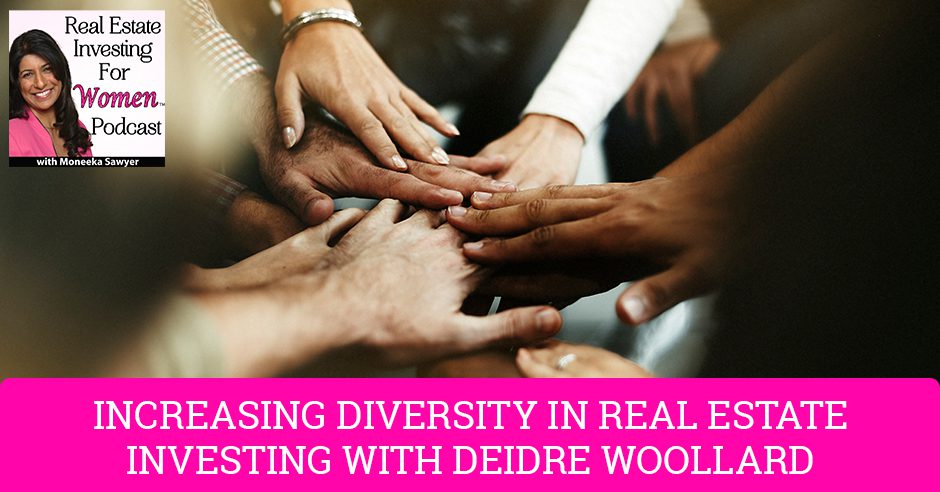
Real estate is a male-dominated industry where women are underrepresented and have a hard time breaking through. Calling for an increase in diversity in real estate investing Moneeka Sawyer interviews writer, editor, and real estate investor, Deidre Woollard of Millionacres. Here, Deidre reminds women investors of their great capacity to find success in the field, inspiring them to get out there and put themselves forward. She talks about investing according to the cycles of our lives, creating a diverse portfolio, real estate crowdfunding, Real Estate Investment Trusts (REITs) and more. Tune into this great episode to receive advice that is for women and given by women. Join Deidre and Moneeka as they provide other great insights unique for women in real estate.
—
Listen to the podcast here
Increasing Diversity In Real Estate Investing With Deidre Woollard
Real Estate Investing For Women
I am delighted to welcome to the show, Deidre Woollard. She is a writer, editor and real estate investor. Her passion for real estate writing began when she created the first Estate of the Day column online and worked for AOL Real Estate. She later worked for Realtor.com and created the Ask A Realtor column. After that, she moved on to spend several years leading marketing departments at luxury brokerages across Los Angeles before co-founding a real estate public relations firm. She now works with the team at Millionacres, helping to provide education on a wide variety of real estate investing topics. Her passion is helping educate people on the ways that real estate helps build wealth. Deidre, welcome to the show.
Moneeka, thank you.
Before I bring Deidre on, ladies, I want to tell you a little story. David and I got married many years ago. In those early days, one of the things that we knew was that money was important in the world. We both came from families that had open conversations about investing, money and how money worked. We also both had ambitions beyond what we had learned from our family. My husband was working at a startup. We were not making very much money. We were broke. We bought our very first home for $10,000 from our wedding. We had so little money left. We had these dreams. We wanted to travel and see the world. We wanted to focus our lives on the fun of living rather than focusing so much on paying the dues when we were young so that we could live later.
We started to investigate what investing could look like even with us, where we had so little money. At least we had bought a house. Both of us knew that was a good idea, but we had so little money. We were paying a mortgage. We rented out a room in the house. We took that money. We wanted to invest it so that we could travel and we can build for our futures. Motley Fool book had come out the year before. We picked up two books. David and I read together every night. This is another one of those things we’ve been doing for many years before we were married. In those early years, we were reading financial books.
Motley Fool was the very first book that we read. It completely changed our perspective on life, money and the world. A few years later, we shut down our houses. David took a leave of absence from work. We put some backpacks on our backs and we traveled the world for six months. I tell people over and over again that it started because we got a good education. Real estate has been a big piece of that, but on the stock side, this was the big influencer. I got an email from Millionacres, which is the real estate division of Motley Fool. They said that they rated my blog as a top ten blog in real estate. I screamed, jumped up and down, I was clapping my hands. My husband was like, “What is going on?” I told him and both of us were so delighted. I immediately contacted them. That’s why we’re talking to Deidre. You have had such a huge impact on my life. Thank you.
One of the reasons Millionacres exists is because we wanted to take that same idea from the Motley Fool and how it helped people and bring that to real estate. There’s so much information out there, but it’s so confusing sometimes. It’s the same mission but translated into real estate.
That’s the gift. With the Motley Fool, they made it approachable, understandable and unscary. We could take some action. I know that’s where you’re headed with this too. It’s needed out there because it can be confusing.
Our goal is to make you smarter, happier and richer, which we all want to be smarter, happier and richer.
Any good investor knows that there's active and passive elements to all investments. Share on XTell us a little bit about how you developed a passion in real estate.
I started from the journalist side, from writing about it. Through writing about it, I started to meet many interesting real estate agents and brokers. This was one of the early days of blogging when there weren’t a lot of blogs. The real estate agents that were getting involved in technology started reaching out to me. It gave me this passion for understanding real estate as a profession and realizing how hard real estate agents work and understanding what the profession is like. I’m seeing the ways how especially women could become entrepreneurs through real estate. That was inspiring to me.
I loved many things about the conversations I’ve had back and forth with you and Sarah. Sarah was the person that reached out to me. When I was connecting with her about who I could bring onto the show to represent Millionacres, she started talking all about the statistics for women in real estate, which is relevant and important. It’s helpful for us women to understand that we’re under-represented, but it doesn’t mean that we don’t have this huge capacity.
One of the things that I’ve seen is that there are a lot of women who are in residential real estate as a career. There aren’t as many women who understand real estate investing or feel confident. One of the things that is true for a lot of women was a study by the Harvard Business Review that men will apply for a job when they’re 60% qualified. Women will not apply until they’re 100% qualified. Sometimes we as women have that little barrier where we feel like, “I’m not sure if I know enough. I’m not sure if I can handle the risk. I feel like I need to wait on the sidelines longer.” That happens both in real estate leadership and in real estate investing. One of my passions is encouraging people to get out there and to put yourself forward.
We’ve had a lot of real estate agents on the show that are women. They have excelled well. Investing is a completely different thing. For whatever reason, it seems like women are more willing to become an agent. They see their clients invest. A male agent will look at the property first to see if he wants it before he offers it to his clients. I’ve seen this out there because I was a mortgage broker. The women will offer to our clients first before she makes an offer, which is not always true. I don’t want to be over general. I saw it a lot. I was like, “Why is this happening?” I was the only female agent that was out there making offers on investment properties. It was interesting. Could you tell us a little bit more about the statistics?
What we did is we surveyed about 650 people and we got their opinions on real estate investing, both gender diversity and racial diversity, what people are seeing, and if they feel like the situations need to change.
What were your results? Tell us about that.
The first thing I found that’s interesting is there’s a little difference in how men and women invest. Our survey found that men are more likely to invest in REITs, Real Estate Investment Trusts, whereas women are more likely to invest in rental properties. That may be a comfort level thing. Sometimes I feel like women are encouraged more toward owning homes versus owning commercial real estate or owning real estate investment trusts. I’m not sure about you, but I feel like a lot of the stock advice sometimes can tend to feel a bit male skewed.

Diversity In Real Estate: As an investor, you don’t necessarily need to be in the same types of investments at different portions of your life.
I was on a class and every single book that was recommended was by a man. They recommended ten books on the show. I thought, “There’s not a single book out there written by a woman that you value.” We see that in our industry a lot.
I see that on the commercial side and also the real estate investment trusts. Most of the books are written by men. I don’t think women understand that especially real estate investment trust or real estate crowdfunding are great passive investments. One of the things I feel is that there’s no such thing as active and passive being separate because they both require a certain level of active and passive. If you’re an active investor, you’re finding ways to automate or to use a property manager. I loved one of your podcasts with Kris Ward talking about how to use automation and things like that. That’s important. Any good investor knows that there are active and passive elements to all investments.
Tell me a little bit about what you perceive as the advantage for women in different investment strategies in real estate.
Some of it is the diversification and understanding what you need in particular time periods in your life. As an investor, you don’t necessarily need to be in the same types of investments at different portions of your life. If you have kids, you might not want to be dealing with individual rental properties when your kids are little or something like that. When you’re older, you may want REITs or something that’s providing you with a little dividend income. If you’re wanting to do short term rentals, let’s say you want to move somewhere else. You may have that short-term rental as that bridge property to get you there. I feel like investing is something that changes throughout your life. We all go through different seasons of our lives. A different type of it can help you with that different stage.
I love the way that you’re talking about the cycles of our life. It’s hitting home for me right now because I’m in a big transition. I started very young. We first bought our first home. There have been a lot of different strategies that we’ve used along the way both for stock and for real estate. For the most part, I’ve had everything in appreciation. I’m in California real estate, most of it is appreciation. We’re changing to cashflow and more passive strategies because David and I are looking at retiring in a couple of years. One of those things that we don’t talk a lot about in the show or anywhere is the cycles. One of the things that I feel that with men, it’s about the strategy and what’s going to make them money and what they’re excited to learn about. For women, we do need to focus a lot more on the cycles, what fits in, where and why and shift as the cycles do. Do you believe that’s true also?
Absolutely. That’s one of the reasons that we have many female writers on Millionacres. We’ve got women who are using different types of strategies throughout their lives. We’ve got one woman who’s investing in a lot of tax notes and she’s traveling the world right now. She and her husband were in Mexico. They own some properties, but they also invest in a variety of other things. It’s about what you want in your life and how real estate can help you no matter where you are and what you’re doing. There have been periods of time in my life when I’ve been more interested in owning property or periods of time in my life where I’m much more interested in something that doesn’t feel quite as labor intensive.
Tell us a little bit about what Mogul does.
Mogul is our premium service from Millionacres. It works like the Motley Fool. The Motley Fool has a free site and then there are premium services that do stock recommendations and things like that. Mogul is like that in that we do real estate recommendations for real estate investment trust and some real estate equities. We also do recommendations for individual real estate crowdfunded deals. Those are usually for accredited investors. You have to have a certain income to qualify for those. You’re investing a sum of money and it is held for a period of time to do something like redevelop an office building or build an apartment complex or something like that. At the end of that, you receive distributions throughout the course of the investment. You get your capital back plus the profits when the deal gets sold.
Diversification is the gift that takes a little bit of pressure off. Share on XMogul focuses on a lot of different strategies. Could you talk a little bit about some of the specific strategies that you like to recommend to ladies to create some diverse portfolio or how do you recommend that?
It depends on how much money you want to spend and what kinds of things you like to do. One of the reasons I like real estate crowdfunding, especially even with something like one of the smaller regulation A-deals where you don’t need to be qualified to be accredited investor. You can still invest a couple of thousand dollars in a REIT to develop certain types of properties. It’s exciting but also diversification is important. One of the things with rental properties or fix and flips is it can be a lot of pressure. Diversification, the gift of that to me is that it takes a little bit of that pressure off. It’s the same way with stock investing. I like to have my money in different sectors because different sectors perform differently at different times. We’ve been studying what’s happening with the COVID-19 pandemic in real estate. You can see that certain sectors are doing well and certain sectors aren’t doing well. Hotels, malls, and things like that aren’t doing well, but you’re watching warehouses, self-storage, data centers, those things are doing well.
Could you tell us a little bit more about how REITs work? I don’t think I’ve had somebody come onto the show and talk about that.
I love talking about REITs. They’re my favorite. REIT is Real Estate Investment Trust. Most of them are publicly traded. You could buy it like a stock, but it’s a little bit different than the stock because they have to pay out 90% of their income. They have to pay you dividends. One of the reasons people like them in retirement accounts is because you get dividends. Most of them are quarterly, but there are a couple of REITs that pay monthly dividends. You can hold them in a retirement account, which is nice because that way you’re not taxed on those dividends. You can hold them in a Roth IRA or something like that. That’s a great way to grow your retirement portfolio.
They have to pay 90% of their income. Why don’t you explain that?
It’s a little bit different than a stock because the REIT is holding real estate. You don’t look at the earnings per share as much. They move a little bit more slowly than stocks. Another piece of research we did was looking at how REITs versus stocks performed over time. We found that over twenty years, REITs will outperform the S&P 500. It hasn’t been true in 2019 where the S&P 500 has outperformed REITs. Especially in 2020 because tech stocks have been zooming including Zoom. Real estate has not been doing so well because of the pandemic and because of how many things were closed, which makes it a good time. A lot of those real estate investment trusts are undervalued for what they are.
Where would you look for those?
In Millionacres, we have a whole section on REITs. They’re part of the stock market. You can start looking at things like malls. Simon Property Group is the biggest mall REIT. There’s Empire State Realty Trust, which owns the Empire State Building. REITs underlie so much of the real estate in the United States. It’s fascinating. You can invest in warehouses. There’s a REIT called Prologis, which is the biggest warehouse REIT. Amazon is their huge customer.

Diversity In Real Estate: Passive does not necessarily mean set-it-and-forget-it. You set it for a certain amount of time, and you revisit it because things change—the economy, your needs, the investment, and the way the market’s moving.
Would you go on Schwab, Fidelity, or whatever and look for REITs? Is that what you would put in there?
They’re like regular stocks.
I had no idea about that. I do this stuff. I didn’t even know about it. I knew about REITs, but I hadn’t done enough research to know very much about them. Do you talk about them on Millionacres?
A lot of our stories are on REITs. We do a lot of talking about this particular sector. That’s one of the things that even within REITs, which is a sector, there are different sectors. There are all those different categories and that’s one of the things that makes it exciting.
It’s so accessible and so easy. It is pretty passive. It’s as passive as you might say with stock. You need to do the initial research.
One of the people at Motley Fool got me into this idea of journaling my investments. Much of the stock market are emotional and you see the market go up and down, and it’s very easy to get caught up in that. When I’m thinking about a new investment, I write down why I want to invest in it, what I think about it. Quarterly, usually when the earnings come out, I love to listen to the earnings calls. I like to hear the voices and the people answering the questions. I go back to that journal entry and it’s like, “Did everything that I believed about that company three months ago still true? Do I still feel the same way? That’s a check-in. It’s passive but it’s not completely passive.
This is worth a deeper conversation. When we talk about passive, it does not necessarily mean, at least in my mind, a set it and forget it. You set it for a certain amount of time and you revisit it because things change. The economy changes. Your needs change. The investment changes. The way the market is moving changes, regardless of the economy. Different industries or investment types change. Things change. Set it and forget it means you’re not tinkering with it all the time, but you should have a period of time that you have set for yourself that you’re going to re-evaluate what you’ve invested in. For David and I, it is a quarterly thing. We do it like you do, Deidre. For my father-in-law, he does it once a year. For my dad, he does it once a month. It’s not like they’re constantly tinkering. It’s not like you’re buying, selling and paying commissions. They’re not doing all that stuff, but they’re re-evaluating their portfolio and their investments at a designated period of time. That is what I consider passive investing. You’re not just letting it go.
It helps take the emotion out of it. The thing that I see with the stock market especially right now is people get so wrapped up in, “I want to buy the bottom. I want to get in at the lowest rate. I want to sell it at the highest rate.” It’s a great idea in theory but it is not practical. What you want to do is spend most of your time. It’s like in real estate when people always say, “You make your money when you buy.” The same thing is true with a real estate investment, trust, or any stock. You spend the time on the research. If you trust the company. You look at the management. You trust everything that they’re doing. You see the vision. Those check-ins are just check-ins. They’re not panic moments. When the market is doing something weird and your stock went way down, you don’t panic because you’ve already made your decision. You trust that company. That’s important is to find those ways.
You don't time the market; you time your life. Share on XI’m an emotional person. I want to find those ways to make myself feel confident. That’s one of the reasons that if I am feeling that way, I do make a note in the journal and talk about that, get it out of my head. I’m not thinking about what the stock market did yesterday and making myself nervous over it and trusting myself. I feel like that’s one of the ways you can learn to trust yourself more, which is important, especially for women in investing.
Much of the time I’ve said, I’ve been told and reminded by my husband, if it wasn’t a good investment when you got it, check that it’s still a good investment and you don’t lose money until you sell. If the market has done crazy things, just check in. Is this still a good investment? If you’re talking about REITs, do you still trust this company? Do you still trust this product? Do you still trust the team? Over time, it will recover. It’s the same with stocks and real estate. If you decide that something has changed in the foundation of that decision, now you can re-evaluate. You don’t lose money until you sell. That freak out mentality and everything’s gone down, let’s sell everything because I don’t want to lose any more money. That’s going to get you into trouble. The other thing that I learned because I was a heavy stock investor early on was this term in stock investing, “Don’t try to catch a falling knife.” Trying to catch the bottom, you’ll get bloody every single time. That’s a terrible analogy. It’s hard to catch the bottom. What you want to do is catch it when it makes good business sense.
A lot of people will get out and then try to get back in. That is a bad idea. Sometimes you have to ride out the bottom. Otherwise, you’re going to miss that return. You’re not going to catch the upswing essentially.
It’s too hard to time it.
It’s like in any type of real estate investing, if you’re buying and selling houses, a lot of people try to time the market. One of the things that I’ve always heard real estate agents say to their clients is you don’t time the market. You time your life.
Real estate is cyclical and it’s long-term. When does it fit into your life? Here’s one other thing around that, you time your life, but understand there’s never a right time. My husband and I were so broke when we bought our first place and we scraped up all our money. It wasn’t a good time for us to own. We wanted to travel the world. Our dreams were not about owning a home. However, we needed to make financial sense so it became a priority. We didn’t feel ready but we did it. I would tell them that all the time. It’s like having kids. Someone would want kids. They wanted kids. It was great. For most people, I know at least this was my experience, there was never a right time to have kids. You have to decide, “This is what I want and do it.” Whether it’s the right time or it doesn’t feel like the right time, if you feel ready or not.
Life will continue to happen. That’s one of the things people do. They try to line up, is this the right time? Sometimes you have to go with what your will is and then use your mind to supplement your will.
Could you tell us what we’re going to be talking about in EXTRA?

Diversity In Real Estate: Our financial health is as important as our emotional, spiritual, and physical health. It is important to also give it the attention, respect, and love.
We’re going to talk a little bit about real estate crowdfunding. I touched a little bit on it, but we’re going to dive into it and explain what it is and whether or not it might be right for you.
We’ve had one guest come onto this show talking about crowdfunding. Many of you, ladies loved him. He did not pursue crowdfunding though. That was a report that I got back. I’m not sure whether it is because you weren’t interested or because it was confusing or whatever. I wanted to make sure that we gave you more information on that. When Deidre mentioned that, I thought it would be a great idea. That’s what we’re going to be talking about in EXTRA. Deidre, could you tell people how they can reach you?
They can go on to Millionacres.com. That is our main site. Our Instagram is @Millionacres. I’m on Twitter @Deidre and Facebook is @Millionacres. I’m out there.
I know that you have a free gift for my ladies. Could you tell us about that?
It’s a real estate investing eBook. It is essentially looking at all of the different ways that you can invest. It also touches on things that we don’t like to talk about like taxes, 1031 exchanges, and things like that. It’s a great basic overview and some of the best writing from a lot of our writers. I’m excited about that one.
Thank you so much for that. Are you ready for our three rapid fire questions?
Let’s do it.
Tell us one super tip on getting started investing in real estate.
Sometimes, you have to go with what your will is and then use your mind to supplement that. Share on XI’ve talked about them so I’m going to have to say it’s REITs. You can buy a REIT for not a lot of money. You can spend a couple of hundred dollars and get a few shares of a REIT. That’s a great way to dip your toes into real estate, especially if you haven’t done that before. I would encourage people to look at REITs as a way to get started in real estate.
What is one strategy on being successful in real estate investing?
It is keeping track and finding a great way to have a spreadsheet or have a journal or have something that you’re checking in with yourself over time. Some people like to use Excel and pivot tables. Some people like to have an old school journal, but whatever you do, what you measure that’s what grows. Keep track and measure everything.
What would you say is one daily practice that you do that contributes to your personal success?
I would say it’s probably the Pomodoro technique, which is that idea of blocking off time. I liked that idea of blocking off time to do certain things. A lot of us get so distracted. If I’m going to be looking at an investment or reading an earnings report, I don’t want to have my Slack pinging me or something like that. I want to dive in. A lot of times, we’re natural multitaskers, especially for women. Finding places where you can focus on your investing in a deep and intense way is important. Our financial health is as important as our emotional health, spiritual health, physical health, and giving it that attention, respect and love is important.
Thank you for that. Deidre, is there anything else you’d like to say that we missed or a message you’d like to leave the ladies with?
The message is to educate yourself and understand that education can come from a variety of places and that there’s no one way to do things right. Experiment, read everything you can like books and blogs, listen to podcasts and then do it. You call that analysis paralysis. That can happen. That’s happened to me a lot. Just do it, spend a little bit of money, try something and see what happens.
Ladies, we have more coming. We’re going to be talking about crowdfunding. If you’re subscribed to EXTRA, please stay tuned. If not but you would like to subscribe to EXTRA, please go to RealEstateInvestingForWomenEXTRA.com. You get the first seven days for free. You can get this episode. You can get a ton of other episodes and binge as much as you like. You can decide if you want to stay subscribed or not. For those of you who are leaving Deidre and I now, thank you so much for joining us. I look forward to seeing you next time. Until then, remember goals without action are just dreams. Get out there, take action and create the life your heart deeply desires. I’ll see you soon.
Important Links
- Realtor.com
- Kris Ward – previous episode
- Simon Property Group
- Empire State Realty Trust
- Prologis
- Millionacres.com
- @Millionacres – Instagram
- @Deidre – Twitter
- @Millionacres – Facebook
- RealEstateInvestingForWomenEXTRA.com
About Deidre Woollard
 Deidre Woollard is a writer and editor with two decades of experience covering all aspects of real estate from luxury residential real estate to the latest in proptech. She created the Ask A Realtor feature at Realtor.com and has led marketing and communications at top residential real estate brokerages.
Deidre Woollard is a writer and editor with two decades of experience covering all aspects of real estate from luxury residential real estate to the latest in proptech. She created the Ask A Realtor feature at Realtor.com and has led marketing and communications at top residential real estate brokerages.
Real estate investing is a family tradition; she comes from a long line of landlords, renovators, and contractors currently invested from Massachusetts to California. She has an MFA in Writing from Spalding University
Love the show? Subscribe, rate, review, and share!
Moneeka Sawyer is often described as one of the most blissful people you will ever meet. She has been investing in Real Estate for over 20 years, so has been through all the different cycles of the market. Still, she has turned $10,000 into over $5,000,000, working only 5-10 hours per MONTH with very little stress.
While building her multi-million dollar business, she has traveled to over 55 countries, dances every single day, supports causes that are important to her, and spends lots of time with her husband of over 20 years.
She is the international best-selling author of the multiple award-winning books “Choose Bliss: The Power and Practice of Joy and Contentment” and “Real Estate Investing for Women: Expert Conversations to Increase Wealth and Happiness the Blissful Way.”
Moneeka has been featured on stages including Carnegie Hall and Nasdaq, radio, podcasts such as Achieve Your Goals with Hal Elrod, and TV stations including ABC, CBS, FOX, and the CW, impacting over 150 million people.





